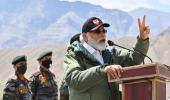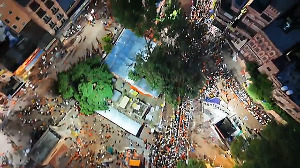'The border stand-off and the uncertainties that come with it should be a wake-up call on what makes for real rather than illusory power,' observes T N Ninan.

Speaking at an Indian Express adda last month, S Jaishankar, the external affairs minister, reportedly told his audience the following about recent India-China summit meetings: 'These were conversations about, we are rising, you are rising, we are going to be among the major powers of the world. We are both civilisation states which will make it into the fourth industrial revolution ... And we happen to be rising approximately in the same sort of parallel timeframe.'
Such a storyline began three decades ago, of two Asian giants rising, and it does not need Mr Jaishankar's calibre or knowledge of China to realise that the line is well past its sell-by date.
China has outstripped India on every front, and now seeks dominance on the continent.
The power imbalance is evident on every metric, and is growing.
China now challenges yesterday's sole superpower, while India finds its zone of influence challenged, if not constrained.
Yes, both countries are rising in a 'parallel timeframe', but given the scale of relative success that means little.
If India and China rising together has indeed been posited in conversations with Xi Jinping, one could well guess how a power-player like the Chinese president might have viewed the message.
Beijing's position today is not what it was in 2010, when Manmohan Singh and his counterpart, Wen Jiabao, said in a joint statement that 'There is enough space in the world for the development of both India and China and, indeed, enough areas for India and China to cooperate'.
India's subsequent under-performance, even as China has accumulated strength and influence, has increased the power imbalance.
China is the world's leading manufacturer, its largest merchandise exporter, and has taken the lead with frontier technologies, many of which have military uses.
We are confronted with a very different China.
Pretending parity is therefore to invite a rap on the knuckles.
It is instructive, in this context, to read in the retired diplomat Rajiv Dogra's latest book, India's World: How Prime Ministers Shaped Foreign Policy, the reference to what Liu Shaoqi, Chinese president at the time of the 1962 war, told Sri Lanka's Felix Bandaranaike: That the conflict was to 'demolish India's arrogance and illusions of grandeur.
Consider, against that backdrop, Home Minister Amit Shah's statement in the Lok Sabha last year: 'Whenever I talk of Jammu and Kashmir, PoK and Aksai Chin come under it and we will die for it.'
Those who know the ground reality might dismiss this as grandstanding.
In Beijing, it could well have been seen as India getting 'arrogant' again.
In The Rise and Fall of the Great Powers, Paul Kennedy looked at military conflict in the midst of economic change, and at 'the interaction between economics and strategy'.
The issue as he saw it was a country's rise or fall not in war but in peacetime, and not as an absolute measure but relative to other powers.
Going by Mr Jaishankar's comments, Mr Kennedy's well-worn argument is what India may have overlooked in its interactions with China -- if indeed 'two countries rising together' was presented as the contextual reality.
Fortunately, whatever has gone on in talks with Mr Xi, India has not sat idle.
It has addressed the power imbalance with China through greater engagement with other countries.
It has improved its border infrastructure by boring tunnels for all-weather road access to Ladakh, throwing bridges across the Brahmaputra in the Northeast, and building multiple routes for logistical flexibility at the contested border.
Regrettably, in both Kargil and now, the army did not wake up before territory was lost.
To be sure, India's military is not what it was in 1962.
But its focus is on avoiding further loss of territory while leaving the rest to diplomacy -- with little result.
A strong military cannot be built with niggardly budgets.
It also needs manufacturing prowess and greater technological capabilities.
Those become more difficult if its human development indicators and per capita income rank India in the bottom third of countries.
The border stand-off and the uncertainties that come with it should be a wake-up call on what makes for real rather than illusory power.
Feature Presentation: Aslam Hunani/Rediff.com












